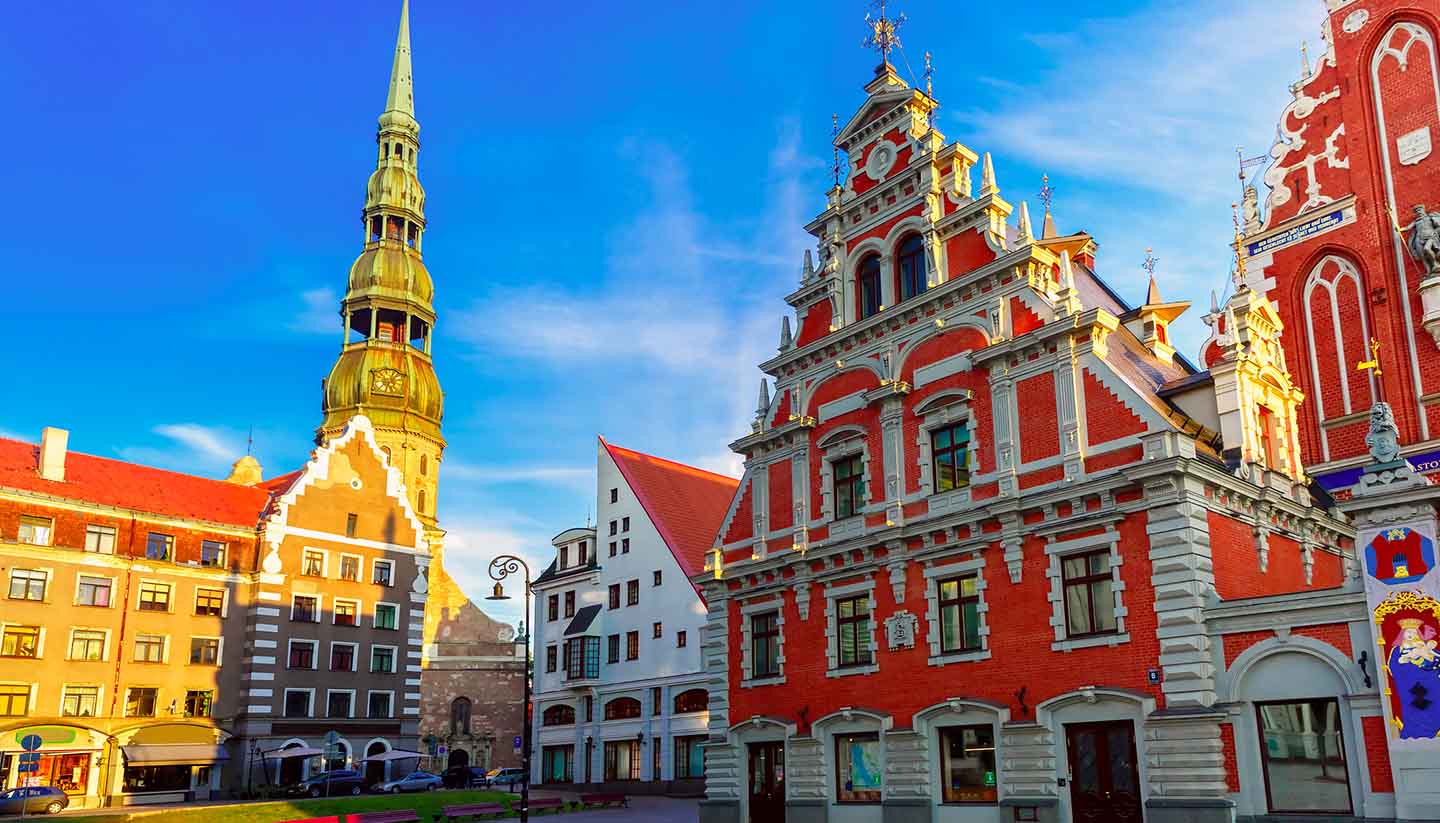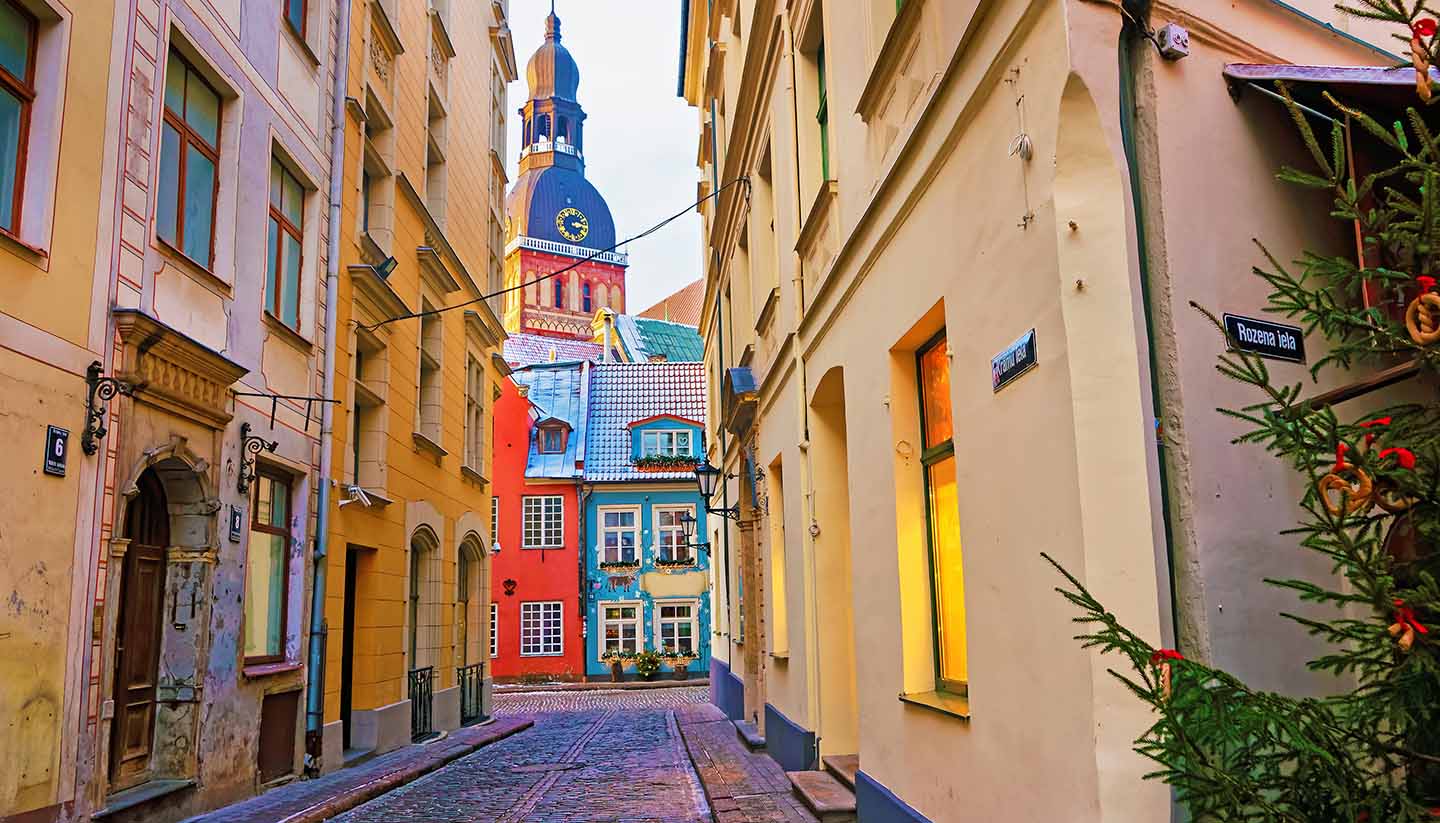Latvia travel guide
About Latvia
Officially known as the Republic of Latvia, this small nation remained tucked behind the Iron Curtain until the early nineties. Today it is one of the most visited countries in the Baltics and lures visitors with its dramatic landscapes, rich heritage and vibrant capital, Riga.
Declared European Capital of Culture in 2014, the city has one of the most impressive collections of art nouveau buildings in the world, not to mention a stunning UNESCO World Heritage downtown. The latter is home to medieval churches, grand Renaissance properties and a spectacular market, which is held inside defunct zeppelin hangers from WWI. The old town is dominated by Riga Cathedral, the largest medieval church in the Baltics and one of many attractions in Riga vying for visitors’ attention.
The path beyond Riga is, for now, not quite so well-trodden. However, riches await those pressing further into the country; there’s the rural paradise of Rundāle Palace, the recently renovated Turaida Stone Castle and the charming Latvian Ethnographic Open-Air Museum. The beautifully preserved historic towns of Kuldīga and Cēsis also warrant excursions.
Latvia is rich in natural attractions, too, like the Gulf of Riga and the windswept coastline along the Baltic Sea, which is home to seemingly infinite sandy shores. Jūrmala, a resort town just 40 minutes from Riga, boasts 26km (16 miles) of golden beaches lined with spas, thermal mud pools and seafood restaurants.
Inland, national parks and nature reserves abound, but Gauja National Park is the most famous. This picturesque river valley is a place of unremitting beauty: rushing rivers, ancient sandstone cliffs and, in spring, masses of white cherry blossoms. Gauja National Park is not only great for hiking, cycling and watersports, but also offers one of the best birdwatching sites in Latvia, after Pape and Cape Kolka.
While low cost air travel has opened Latvia to the masses, most visitors still struggle to venture beyond the capital. However, those who do find treasure in this country will, as the tourist board likes to say, discover it is “best enjoyed slowly.”
Key facts
64,589 sq km (24,938 sq miles).
1,937,944 (UN estimate 2018).
30 per sq km (77 people/sq mile).
Riga.
Parliamentary Republic
President Edgars Rinkēvičs since 2023.
Prime Minister Evika Silina since 2023.
Travel Advice
Before you travel
No travel can be guaranteed safe. Read all the advice in this guide. You may also find it helpful to:
- see general advice for women travellers
- read our guide on disability and travel abroad
- see general advice for LGBT+ travellers
- read about safety for solo and independent travel
- see advice on volunteering and adventure travel abroad
Travel insurance
If you choose to travel, research your destinations and get appropriate travel insurance. Insurance should cover your itinerary, planned activities and expenses in an emergency.
About FCDO travel advice
The Foreign, Commonwealth & Development Office (FCDO) provides advice about risks of travel to help you make informed decisions. Find out more about FCDO travel advice.
Get travel advice updates
Sign up to get email notifications when this advice is updated.
Follow FCDO:
This information is for people travelling on a full ‘British citizen’ passport from the UK. It is based on the UK government’s understanding of the current rules for the most common types of travel.
The authorities in Latvia set and enforce entry rules. If you’re not sure how these requirements apply to you, contact the Latvian Embassy in the UK.
British-Russian dual nationals
If you hold dual nationality with Russia, you could be refused entry to Latvia. See current legal guidance for Russian citizens, which is now in force until 4 March 2025.
Passport validity requirements
Latvia follows Schengen area rules. Your passport must:
-
have a ‘date of issue’ less than 10 years before the date you arrive – if you renewed your passport before 1 October 2018, it may have a date of issue that is more than 10 years ago
-
have an ‘expiry date’ at least 3 months after the day you plan to leave the Schengen area (the expiry date does not need to be within 10 years of the date of issue)
Check with your travel provider that your passport and other travel documents meet requirements. Renew your passport if you need to.
You will be denied entry if you do not have a valid travel document or try to use a passport that has been reported lost or stolen.
Visa requirements
You can travel without a visa to the Schengen area, which includes Latvia, for up to 90 days in any 180-day period. This applies if you travel:
- as a tourist
- to visit family or friends
- to attend business meetings, cultural or sports events
- for short-term studies or training
The requirements for working in Latvia are different.
If you’re travelling to other Schengen countries as well, make sure your whole visit is within the 90-day visa-free limit. Visits to Schengen countries in the 180 days before you travel count towards your 90 days. If you overstay the 90-day visa-free limit, you may be banned from entering Schengen countries for up to 3 years.
Make sure you get your passport stamped on entry and exit.
If you’re a visitor, border guards will look at your entry and exit stamps to check you have not overstayed the 90-day visa-free limit for the Schengen area.
If your passport is missing a stamp, show evidence of when and where you entered or left the Schengen area (for example, boarding passes or tickets) and ask the border guards to add the date and location in your passport.
At Latvian border control, you may need to:
- show proof of your accommodation, for example, a hotel booking confirmation or proof of address for a second home
- show proof of your travel insurance, including health cover and medical repatriation
- show a return or onward ticket
- prove that you have enough money for your stay – the amount varies depending on your accommodation
Staying longer than 90 days in a 180-day period
To stay longer, you must meet the Latvian government’s entry requirements. Check which type of visa you need with the Latvian Embassy in the UK.
If you’re in Latvia with a residence permit or long-stay visa, this does not count towards your 90-day visa-free limit.
Read about passport stamping if you live in Latvia.
New Schengen entry requirements
The EU’s Entry/Exit System (EES) is expected to start in October 2025. It is not currently in operation. The European Union will inform about the specific start date of the EES before its launch.
Read more information on the EU Entry/Exit System.
Vaccine requirements
For details about medical entry requirements and recommended vaccinations, see TravelHealthPro’s Latvia guide.
Customs rules
There are strict rules about goods you can take into or out of Latvia. You must declare anything that may be prohibited or subject to tax or duty.
Taking food and drink into Latvia
You cannot take meat, milk or products containing them into EU countries. There are some exceptions such as powdered baby milk, baby food and special foods or pet feed required for medical reasons.
Taking money into Latvia
Declare cash or travellers cheques if the value is 10,000 euros or more. You will get a certified declaration to show you brought it in with you. If you do not, your money could be seized when you leave.
Restrictions on Russian and Belarusian vehicles
Vehicles with Russian and Belarusian plates and registration are – with a few technical exceptions – banned from entering Latvia and using Latvia’s roads. See Latvia’s State Revenue Service and Latvia’s Ministry of Foreign Affairs for more information.
Terrorism
There is a high threat of terrorist attack globally affecting UK interests and British nationals, including from groups and individuals who view the UK and British nationals as targets. Stay aware of your surroundings at all times.
UK Counter Terrorism Policing has information and advice on staying safe abroad and what to do in the event of a terrorist attack. Find out how to reduce your risk from terrorism while abroad.
Terrorism in Latvia
Although there’s no recent history of terrorism in Latvia, attacks cannot be ruled out.
Belarus border
FCDO currently advises against all travel to Belarus. There is limited access along parts of Latvia’s border with Belarus. The Silene-Urbani road border crossing is currently closed. More border checkpoints may close or implement restrictions at short notice.
Access to within 2km of the border with Belarus is limited. If you wish to enter the border area, you are required to obtain a special licence issued by the Latvian Border Guard. You should abide by this limitation at all times and follow the instructions of Latvian authorities if you are in this area.
Crime
Protecting yourself and your belongings
Petty crime, particularly bag snatching and pickpocketing, is a greater risk in:
- Riga Old Town
- Central Market
- central train and bus stations
Take extra care in these areas and:
- avoid unlit streets and parks at night
- stay alert if walking alone and be wary of people who approach you
- keep your documents and valuables in hotel safes or somewhere secure
Scams
Some tourists have been charged high prices for drinks or have found fraudulent transactions on their credit and debit cards. You should:
- make sure a transaction on a credit or debit card is completed in your presence
- be wary of attempts to make you re-enter your PIN
- get recommendations for bars and clubs from trustworthy sources
Bank card fraud
Fraudsters can steal your card details without you noticing. Use ATMs inside banks if possible, and check ATMs on the street for signs of tampering. Keep cards in sight when paying in shops and restaurants. Read more about how to avoid bank card fraud.
Drink and food spiking
There have been instances of drink spiking in Riga and elsewhere in Latvia. Do not leave drinks unattended and be wary of accepting food and drink from strangers in bars, nightclubs and restaurants.
Theft from vehicles
Try to use car parks with CCTV. Make sure your vehicle is locked and your belongings are out of sight.
Laws and cultural differences
Personal ID
Always carry a copy of your passport’s photo page.
Alcohol laws and bans
Drinking alcohol in public, including in parks and in the streets, is illegal. The police could arrest and fine you.
Illegal drugs
Do not get involved with illegal drugs of any kind. Possession of even very small quantities of drugs can lead to large fines or imprisonment.
Public transport
You can get on-the-spot fines for travelling on public transport without a ticket or with an unvalidated ticket. Validate your ticket with the machine as soon as you board the bus or tram.
LGBT+ travellers
Same-sex sexual activity is legal in Latvia. Same-sex unions were legalised in 2023 and will be able to take place from July 2024.
While there are some LGBT+ friendly venues in larger cities, small towns and rural areas can be less accepting of LGBT+ travellers.
Read more advice for LGBT+ travellers.
Transport risks
Road travel
If you are planning to drive in Latvia, see information on driving abroad and check the rules of the road in the RAC’s Latvia guide. The guide lists driving regulations and other legal requirements you need to be aware of.
You can drive in Latvia with a UK driving licence. If you are living in Latvia, check the driving requirements for residents.
Carry your original vehicle registration documents when travelling to Latvia by car or motorcycle. If you do not have these documents, you will not be allowed to take your vehicle back out of Latvia.
Check if you need a UK sticker to drive your car outside the UK.
Hire car companies often have stricter requirements for their customers, such as a year of driving experience or a higher minimum age.
Taxi safety
To reduce the risk of being charged inflated fares:
- organise a ride with a major taxi company such as Baltic Taxi or Red Cab
- hail or go to a taxi rank to find an official registered vehicle with yellow licence plates
- agree the approximate price of the journey before setting off – some visitors have reported meters being adapted to clock up higher rates
Extreme weather
Winter
Be prepared for extremely cold and possibly hazardous weather if you travel to Latvia in the winter – between October and March. Temperatures may drop to -25°C or below. Snowfalls can result in delays and cancellations on public transport and difficult road conditions.
Before you travel check that:
- your destination can provide the healthcare you may need
- you have appropriate travel insurance for local treatment or unexpected medical evacuation
This is particularly important if you have a health condition or are pregnant.
Emergency medical number
Call 113 and ask for an ambulance.
Contact your insurance company quickly if you’re referred to a medical facility for treatment.
Vaccine recommendations and health risks
At least 8 weeks before your trip:
- check the latest vaccine recommendations for Latvia
- see where to get vaccines and whether you have to pay on the NHS travel vaccinations page
See what health risks you’ll face in Latvia, including tick bites during the warm season between March and October. Tick bites occasionally carry diseases like encephalitis and Lyme disease.
Medication
The legal status and regulation of some medicines prescribed or bought in the UK can be different in other countries.
Read best practice when travelling with medicines on TravelHealthPro.
Healthcare in Latvia
FCDO has a list of medical facilities in Latvia where some staff will speak English.
Health insurance cards
To get medically necessary state healthcare in Latvia, you need a Global Health Insurance Card (GHIC) or a European Health Insurance Card (EHIC).
The NHS’s getting healthcare abroad webpage has details about:
- how to apply for a GHIC
- how to get temporary cover if you lose your card or it does not arrive in time
- who qualifies for a new EHIC instead of a GHIC
- what treatment counts as medically necessary
A GHIC or EHIC is not an alternative to travel insurance. You may have costs your GHIC or EHIC does not cover, including:
- changes to travel and accommodation bookings
- additional standard costs for treatment
- medical repatriation to the UK
- treatment that is ruled non-urgent
- private healthcare
- private clinics
There is also guidance on healthcare if you’re living in Latvia.
Travel and mental health
Read FCDO guidance on travel and mental health. There is also mental health guidance on TravelHealthPro.
The Foreign, Commonwealth & Development Office (FCDO) cannot provide tailored advice for individual trips. Read this travel advice and carry out your own research before deciding whether to travel.
Emergency services in Latvia
Ambulance: 113
Fire: 112
Police: 110
Riga Tourist Police: +371 6718 1818
Contact your travel provider and insurer
Contact your travel provider and your insurer if you are involved in a serious incident or emergency abroad. They will tell you if they can help and what you need to do.
Refunds and changes to travel
For refunds or changes to travel, contact your travel provider. You may also be able to make a claim through insurance. However, insurers usually require you to talk to your travel provider first.
Find out more about changing or cancelling travel plans, including:
- where to get advice if you are in a dispute with a provider
- how to access previous versions of travel advice to support a claim
Support from FCDO
FCDO has guidance on staying safe and what to do if you need help or support abroad, including:
- finding English-speaking lawyers, funeral directors and translators and interpreters in Latvia
- dealing with a death in Latvia
- being arrested or imprisoned in Latvia
- getting help if you’re a victim of crime
- what to do if you’re in hospital
- if you’re affected by a crisis, such as a terrorist attack
Contacting FCDO
Help abroad
See how to get help from the UK government abroad including in an emergency.
Help in the UK
You can call FCDO in London if you need urgent help because something has happened to a friend or relative abroad.
Telephone: 020 7008 5000 (24 hours)
Get travel advice updates
Sign up to get email notifications when this travel advice is updated.
Follow FCDO:
Risk information for British companies
The Overseas Business Risk service offers information and advice for British companies operating in Latvia on how to manage political, economic, and business security-related risks.




